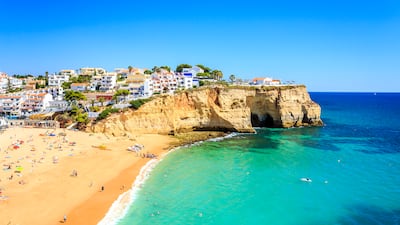The Ruler of Sharjah has reignited debate over the future of the Arabic language, after raising concerns over its "westernisation".
Sheikh Dr Sultan bin Muhammad Al Qasimi this week said the introduction of foreign words into Arabic discourse had become "excessive".
He used the example of the word "trend", saying it was an "incorrect Arabic term that people have acquired", during a phone interview on the Direct Line radio show in Sharjah.
Sheikh Dr Sultan has long championed the preservation of a language spoken by more than 300 million people around the world.
He stated his intention to attend the Arabic Language Academy conference in Cairo on October 2 to address the issue.
"Some people may be 'westernised' but this is our unique language, which we are protecting," the Ruler of Sharjah said.
So is one of the world's most spoken languages in danger of being watered down? Or is the introduction of foreign words merely the evolution of an agile language in changing times?
The National spoke to a TV presenter, a parent and language experts to gauge their views.
Textspeak creeps in
Hadeel Jbour, 23, a UAE TV presenter, explained how the global rise of textspeak in WhatsApp messages and on social media has played a part.
She said learning Arabic was no longer "the norm" in the Emirates, a culturally diverse country that is home to about 200 nationalities.

“Many of my friends write Arabic using English characters but it's not uncommon for some to make mistakes in doing so," said Ms Jbour.
"This phenomenon isn't surprising given the multicultural and multinational environment we live in.
"Consequently, English has become the default language for most people here, especially since there are non-Arabic speakers in our community.
"Learning Arabic, which is renowned as one of the world's most challenging languages, is not the norm.”
Call for schools to promote language
Esraa Al Remeithi, a mother of four in Al Ain, said there was a greater focus given to the teaching of English in her children's school.
“I decided to enrol my children in a private school primarily because of the enhanced attention they receive there," she said.
"Moreover, the English language is taught by foreign teachers rather than Arab instructors. Given that English has become the language of the century, this was a significant factor in our decision.
"Even in public schools, mathematics and science subjects are now taught in English. English has assumed a prominent role in education, sometimes overshadowing Arabic.”
While keen for her children to be well-versed in English, Ms Al Remeithi said the Arabic language should be afforded greater protection.
“Currently, the Arabic curriculum consists of a single book that covers Islamic studies, history and Arabic language," she said, referring to the teaching at her children's school.
"In contrast, during our time we had multiple Arabic textbooks and more extensive Arabic classes. English used to be taught in a single session.
"While English is undeniably important in today's world, Arabic remains our mother tongue. Our children require proficiency in both languages, especially given the demand for English in various fields, including work, education and development.
"Unfortunately, we've noticed that our children now speak Arabic with some difficulty, often in a broken manner.”
Language is key to Arab identity
Yusra Al Hashimi, founder and chief executive of Iqra’a Arabic Language Centre in Dubai, stressed the importance of a thriving native language to a country's culture and identity.
“Many international languages, such as Russian, Spanish, French and Italian, maintain their linguistic integrity without significant mixing with other languages," she said.
"The increasing number of foreign schools is contributing to the deterioration of Arabic proficiency among students and the broader community.
“When meeting people in a restaurant, I can often discern their country of origin based on their dialect, whether it's Egyptian, Syrian or another variation. Language plays a pivotal role in shaping one's identity. It's more than just words; it reflects culture and thoughts, significantly influencing individuals."
Support for Ruler's stance
Shaikha Al Zaabi a lecturer in the Arabic department at Sharjah's University of Kalba, welcomed Sheikh Dr Sultan's remarks.
“We are with the direction of the Ruler. This is for the benefit of the Arabic language to preserve it," she said.
"It is the language of the holy Quran. We should strongly stand against such campaigns from the West or against the new words that are spreading.
"Practising the Arabic language should be a lifestyle for us and nobody should force it on us because we are the children of this language.
"The new generations these days have different interests. They are interested in the beauty of the words while speaking by mixing English words.”
Cherishing the written word
Larbi Ben Thaier, a senior instructor of Arabic at Abu Dhabi University, said there should be different expectations when conversing with friends, compared with writing in Arabic.
"We are being unrealistic when we call on people to speak the formal Arabic casually at home, on the street or in coffee shops," he said.
"The practise of formal Arabic in daily life has been rare, even in historical times. However, when it comes to written Arabic, it is essential to preserve the minimum and necessary elements of formal Arabic.
"Evolution and adaptation to the needs of each generation are reasonable but completely abandoning formal Arabic for the sake of convenience would undoubtedly harm the language.
"Compromising the Arabic language under the pretext that life is evolving and dialects are becoming languages is neither feasible nor acceptable in my view.”








